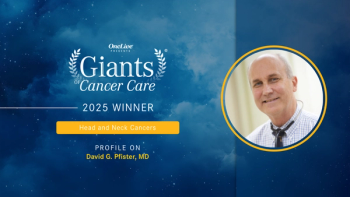
Radioactive Iodine Treatment for Thyroid Cancer
For High-Definition, Click
Given the indolent and slow growing nature of thyroid cancer, there is debate concerning which patients require treatment. The first line of therapy, radioactive iodine (RAI), acts similarly to a heat-seeking missile that travels through the body destroying thyroid cancer cells, Michael Tuttle, MD, explains. In most situations, the need for RAI therapy can be individualized based on several factors, including a patient’s risk of recurrence, tumor size, location, and number of lesions.Â
Patients with larger tumors who have lymph node involvement have a much higher risk of recurrence and should be treated with RAI therapy, Tuttle notes. However, low-risk patients, with only a 1% chance of recurrence and with accessible tumors, do not benefit from RAI therapy, Tuttle suggests.Â
The controversy regarding whom to treat mainly concerns patients who fall in the middle of the continuum of risk for recurrence. In these cases, along with risk, the patient’s input and access to experienced ultrasonagraphers and ultrasensitive serum thyroglobulin tests may contribute to the decision to initiate RAI, Tuttle explains.Â
Assessing whether the tumor has become RAI-refractory represents a separate challenge in the treatment of patients with thyroid cancer. Matthew Taylor, MD describes 3 scenarios in which the patient would be considered RAI-refractory in clinical trials: 1) a patient with known metastatic disease who does not demonstrate RAI uptake on a whole-body iodine scan; 2) a patient who has been treated with RAI and experiences disease progression within a year of their last RAI treatment; or 3) a patient who has been treated with a cumulative dose of 600 millicuries of RAI.Â
However, not all patients who are RAI-refractory fall within these criteria, Taylor explains. Clinical experience, consistent testing, and imaging can help identify RAI resistance. Once a refractory disease is indicated, a multidisciplinary approach should be taken to decide the next course of action.Â


































